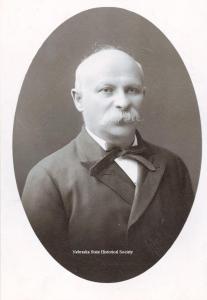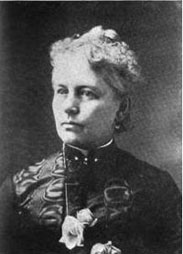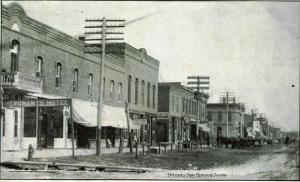 Edward Rosewater. HN RG2411.PH0-4772-2
Edward Rosewater. HN RG2411.PH0-4772-2
A wave of temperance feeling during the late 1880s (promoted by “dry” societies, churches, and the Prohibition Party) culminated in Nebraska in 1890 with a popular vote on a prohibition amendment to the state constitution. For many months leading up to the November election the prohibitionists sponsored pro-amendment lectures around the state, including a series by Helen M. Gougar, a prominent woman suffragist and temperance advocate from Indiana. During one of Gougar’s lectures in Tekamah, she clashed with Edward Rosewater, editor of the anti-amendment Omaha Bee. Gougar succeeded in having Rosewater arrested when he tried to answer her criticism of him, and the matter wound up in district court, which ultimately vindicated Rosewater.
 Helen M. Gougar
Helen M. Gougar
The Bee said in its April 24, 1890, summary of the dispute and accompanying court cases: “About October 25 [1889] Mrs. Helen M. Gougar, the notorious temperance agitator, delivered an address in Lincoln, during the delivery of which she charged that THE BEE had been subsidized by the liquor dealers’ association, and that the editor of THE BEE had connived with the liquor dealers to defeat the prohibition amendment and was paid $4,000 for his work.” Rosewater decided to go to Tekamah, where Mrs. Gougar was speaking on the evening of October 28, to compel her to publicly retract the accusation. When Rosewater entered the hall where Gougar was speaking, he listened for about thirty minutes and then walked to the center aisle and asked permission to interrupt the speaker with a question. Mrs. Gougar refused to allow it, and Rosewater was subsequently escorted from the hall by a deputy sheriff. Later that night he was arrested and jailed on the charge of disturbing a religious meeting. The next morning Rosewater was released, with a court date set for November 8, 1889, in Tekamah.
 Tekamah’s main street. HN RG3257-4-3
Tekamah’s main street. HN RG3257-4-3
After a guilty verdict in the lower court, Rosewater immediately appealed the verdict to the district court. This time the outcome was different. The charge against the editor of the Bee, that of disturbing a religious meeting, was dismissed, because Burt County authorities were unable to prove that the Tekamah meeting during which Gougar and Rosewater had clashed, had been religious rather than political. Rosewater vented his feelings on April 25, 1890, on the editorial page of the Bee by denouncing the prosecution of him and hailing the district court decision as “a timely and merited rebuke to intolerance.” More information on the fight for prohibition in Nebraska in 1890 is available online in Nebraska History magazine, a benefit of History Nebraska membership. Both full members and subscription-only members receive four issues yearly. – Patricia C. Gaster, Assistant Editor / Publications



